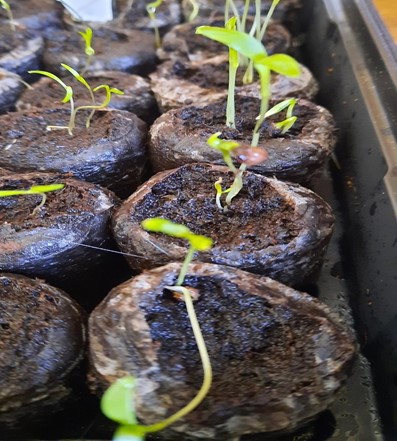What do farming and science fiction have in common? Jerry DeVine says both “hope to break through and rise above the forces of resistance.”
REV. DR. JEROME DEVINE
Superintendent, Mid-Michigan District
Jesus said to them, “Listen! A sower went out to sow. …” (Mark 4:3)
It is that time of year again, at least in our Michigan “planting zone.” By now, you have already seen farmers doing final preparations to the fields to plant their crops. You have seen the signs that nurseries and garden centers are open and eager to have you explore the beauty of their plants.

I am always eager in the spring to start planting, having grown up on a farm and having a mother who planted a huge garden to feed all nine of us. Yet, this year I seemed more eager than usual. I jumped ahead of the recommended season and planted numerous flowers, vegetables and herbs on May Day, knowing full well I might have to cover them to avoid frost. The necessary restrictive dynamics of the past 15 months, along with other forces at play within our Church, country, and world, awakened a deep need in me to cast forth seeds of hope for new life. I even planted little seeds in a seedbox so that I might see new growth rise up out of the dark soil.
It seems to me that gardeners and farmers have something in common with science fiction writers and film producers. They both seek to convey hope that new life can burst forth from dark places and challenging forces. Think about it for a moment before dismissing the idea. Many science fiction writers use apocalyptic or post-apocalyptic themes to develop their storylines and characters. The same is true in film variations. I am not talking about the horror film genre, but true science fiction. Whether it is the Star Wars film sagas or the rich and complex writing of Tolkien, we are invited into a world where mere mortals, often on the fringe of where power is centralized, find ways to cast seeds of hope and possibility into the circumstances they face. They persevere against forces known and unknown. Those forces are not always negative or evil, just challenging. And, yes, sometimes there are malevolent forces that do not want hope to prevail.
Gardening can be much the same, and for some families, those gardens are a lifeline for food equity and nourishment. When forces such as frost, drought, pestilence, weeds, and varmints try to hinder, restrict, steal or destroy, the gardener works ever harder to nurture the seeds of hope that were planted. They do so because they can envision the fruit of their harvest. They do so because they know it matters. They do so for hope to break through and rise above the forces of resistance.
Perhaps we can use this analogy as we think about emerging into a new normal and new future in our local churches and our wider United Methodist Church in the year ahead. Jesus shared a parable about a sower found in Matthew, Mark, and Luke’s gospel writings. Perhaps you know the story. Jesus tells about how the sower casts the seeds, seemingly extravagantly rather than carefully placing each tiny seed in its place. The extravagance is to create the greatest possibility that new growth will take place. The sower knows that some will fall on the pathway and get eaten by the birds or field mice. Some will fall on shallow soil and quickly spring up, but because the roots cannot grow deep, those seedlings will shrivel up. Some seeds may sprout, but the thorny weeds do not like the competition and choke out the sun and rain. Yet, some seeds fall on fertile and ready soil despite all of those obstacles, and they thrive.
Our local churches are not immune to those same dynamics. As clergy and key involved laity seek to cast seeds of new possibilities, there will be people in the pews who have no openness and thus are like the pathway where the seeds fall, but there is no capacity to take root. There will be those who, in the beginning, are eager and receptive, but when the roots of new approaches seek to go deep, their willingness to be changed is shallow, and they soon dry up their support. The Gospel of Mark puts it this way:
“And these are the ones sown on rocky ground: when they hear the word, they immediately receive it with joy. But they have no root and endure only for a while; then, when trouble or persecution arises on account of the word, immediately they fall away.” (Mark 4:16-17)
Then there are the thorny weeds that Jesus talks about. Nothing is allowed but what they determine. Jesus says, “Other seeds fell among thorns, and the thorns grew up and choked it, and it yielded no grain.” (Mark 4:7)
Now, in each of these first three types of “soil,” it is not necessarily that this type of soil is bad or evil. It is simply that this soil is not beneficial and certainly will not allow for new growth and life. I can still vividly recall the administrative board meeting of one of my local church appointments when a wonderful seed of hope fell in a patch of weeds. A younger adult and her family had recently begun attending worship and were getting involved. It would soon be Advent, and she came up with a creative way to engage intergenerational involvement in that holy season. I invited her to bring the idea to the administrative board because it would require some resources and change some historical practices. Oh my, I learned a great deal that night. I was certain that others would be as excited as I was about the seeds of new possibilities that would be sown that evening. Some started to show signs of interest in letting the idea sprout, but then one key leader choked it out. Her comments shut out any light to let the seed sprout. Sadly, within weeks, the young adult and her family left the church. Ironically, if not maddeningly, the naysayer brought nearly the same idea back one year later.
The forces we face may not be apocalyptic on a grand or eternal scale, yet they are forces nonetheless. Every year I still choose to plant gardens, knowing that I will have to weed, weed again, water and water again, protect and watch over, so that the seeds can come to full fruition. I do so because those words of Jesus are embedded in my core being:
“Other seeds fell into good soil and brought forth grain, growing up and increasing and yielding thirty and sixty and a hundredfold.” And he said, “Let anyone with ears to hear listen!” (Mark 4:8-9)
I am fortunate to be a member of The Connectional Table of our United Methodist Church. In our most recent board meeting, we unanimously approved a proposal for the Connectional Table to facilitate conversations around the globe about our identity, mission, and vision for the future. Our deepest yearning is that these types of conversations will be a gathering of seed-sowers at regional and local levels in many countries where glimpses of the hopeful future will be scattered on hearts and minds. Nurtured deep within the soil of the soul, they will then sprout, bringing forth the new life that the Light of Christ promises.
Even as these conversations begin to find shape, there are other conversations already going on that have planted seeds of new ideas for a fruitful future of the United Methodist Church. Also linked to the Connectional Table is the Emerging Project that invites seed-sowers from across the denomination to a “venue for conversation about what is emerging in Methodism, including voices from a multiplicity of viewpoints.” It is a well-known fact that bio-diversity in gardening and farming is healthier and more sustainable than only allowing one crop selection to dominate. The same can be said for discovering and nurturing hope.
Another exciting conversation is titled “Out of Chaos … Creation”. Simply put, the organically organized facilitators say, “In conversation across our global connection, we are imagining new ways of being United Methodists.” Seed-sowers of hope are actively casting their seeds through conversations and imagining the next generation of our movement of United Methodism.
I know that some hearts and minds have no openings for seeds to sprout right now. I know that there are shallow commitments that quickly affirm then fail just as quickly. I know there are naysayer thorns that would prefer to see the life of the United Methodist Church stifled and prevented from thriving. Yet, I also know there is good soil among the vast majority of United Methodists, and all that is needed for new life is to cast these seeds of hope and possibility in those hearts, minds, and souls. The same applies in your local church.
Be extravagant as you cast your seeds of hope. There are many people yearning to let them sprout within their lives, faith journeys, and communities.
Last Updated on January 11, 2023

